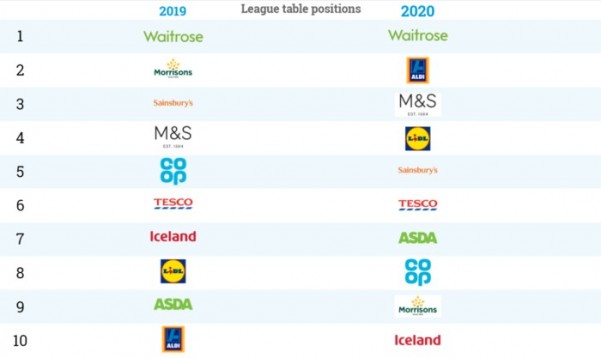Many of the UK’s leading supermarket chains are “treading water” in the fight against plastic pollution, new research suggests, with branded goods said to be holding back progress.
The third annual plastics survey by EIA and Greenpeace UK – Checking Out on Plastic III – showed that the 10 leading supermarkets collectively put 896,853 tonnes of plastic packaging on the market in 2019. But while this was a reduction of 1.6% on 2018, it equates to 1.2% increase from 2017 when the survey was first conducted.
The report ranks the 10 main supermarkets in terms of efforts to reduce plastic pollution and this year’s scorecard shows Waitrose at the top for the second consecutive year, with Iceland in tenth place despite its well-publicised efforts to cut back on plastic.

EIA Senior Ocean Campaigner Christina Dixon said: “In our third year of looking at plastic packaging in UK supermarkets, we had hoped to see a much sharper downwards trajectory as strategies and targets bear fruit. Instead, we are looking at a relatively static picture – the sector urgently needs to pick up the pace.”
Data supplied by the supermarkets for the survey showed while most companies reported reductions on own brand plastic packaging, the percentage of branded packaging in 2019 increased by 5% compared to 2017.
Dixon added: “Supermarket targets and reduction efforts are primarily focused on own brand plastic packaging, which makes sense as they have more direct control over the supply chain.
“However, this means that the amount of packaging used for popular branded goods is not reducing and we’d like to see supermarkets increasingly taking the fight to the big manufacturers and compelling them in turn to drive down their own plastic footprints.”
Meanwhile, Iceland hit out at the study which criticised the chain for its plastic bag usage, lack of fruit & veg being sold loose, and a big rise in branded plastic in its stores.
The retailer actually topped ranking in its first year in 2017 and had reduced plastics on its own brand by nearly a third by the time of the latest report.
Stuart Lendrum, head of packaging, quality and food safety at Iceland, said the report was “knowingly based on flawed analysis that significantly misrepresents Iceland’s position and achievements, while favouring supermarkets operating in a different context of larger stores or more affluent customers”.
He added: “The report is framed around a few key themes – notably on the virtues of refill schemes, loose produce and pressure put on branded suppliers to reduce their own plastic consumption – that are always going to be challenging for a smaller discount specialist like Iceland. This means that it undervalues the important activity that is going on to reduce plastic in the mass market.
“Iceland remains the only supermarket to have committed to remove plastic in its entirety from our packaging, and has led the industry on transparency of reporting, being the first supermarket to publish its complete plastic footprint.”
Some of the other supermarkets also commented on the report.
A Tesco spokesperson said: “We recently announced we successfully removed 1bn pieces of plastic and got rid of hard-to-recycle materials. Through these actions, Tesco is driving change.
“We continue to remove excess packaging from our business, and despite major challenges of Covid, we have made good progress in tackling the impact of plastics through our 4Rs packaging strategy – remove, reduce, reuse, recycle – and we have ambitious plans for 2021 and beyond.”
An Asda spokesperson said: “We are pleased that Greenpeace has recognised the steps we are taking to reduce plastic waste by highlighting that more than half of the total plastic weight reduction across the industry in 2019 was the result of measures introduced by Asda.
“However, we know there is more to be done and have an ambitious goal to remove 3bn pieces of plastic packaging from our operations by 2025.”




